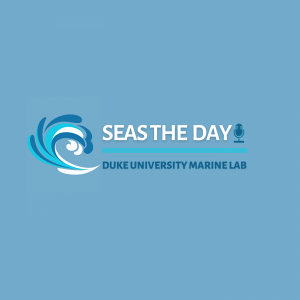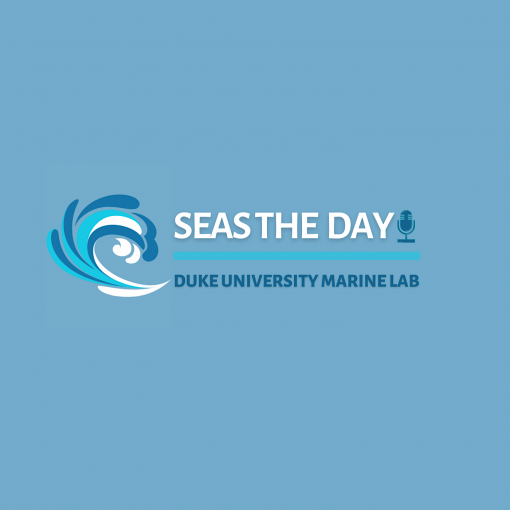In this first of a three episode series, Amy Buckalew reads her story of Ollie the Orca. The story explores concepts of resilience and was written as part of a Duke Engage summer program at Duke University Marine Lab. The program was run by Dr. Liz DeMattia, director of the Community Science Initiative, with the assistance of PhD student Laura Givens, who was the site coordinator for Duke Engage, in 2022. Following the ‘reading’, Laura interviews Amy on her experiences in the program and the logic of the story.
Listen now
Series Hosts

Laura Givens is a PhD candidate in Dr. Tom Schultz’s Marine Conservation and Molecular Facility at the Duke Marine Lab. The focus of her research generally takes advantage of advances in genomic technologies to address community response to environmental change. Her current research uses environmental DNA to examine the success of oyster reef restoration and the extent to which introducing aquaculture supplements biodiversity. Laura graduated with a B.S. in Biology from California State University, Sacramento in 2018 and has received the Smithsonian Graduate Student Fellowship. She co-leads the coastal branch of the Scientific Research and Education Network and in her free time enjoys painting and beach walks with her dog.
Twitter: @LGivens27
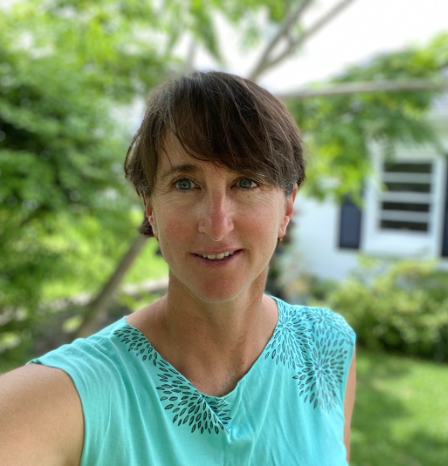
Dr. Liz DeMattia is a Research Scientist at the Duke University Marine Lab and the founding director of DUML’s Community Science Initiative. Liz has more than 25 years of experience conducting ecological research and developing environmental outreach for community-based conservation programs. When not working on education and conservation programs, Liz can be found swimming in the ocean, hiking in the forest, or hanging out with her family.
Amy Buckalew, author of ‘Ollie the Orca’

Amy is a rising sophomore at Duke University, planning to study Statistical Science and Computer Science with a concentration in Data Science. She hopes to apply her studies to her other interests, which include climate, atmospheric, and marine sciences. Amy was part of the DukeEngage Conservation and Community: Working with Education and Conservation Organizations in Rural, Coastal Communities program for the summer of 2022. Throughout the summer, she worked with Carteret County Public Schools and Coastal Carolina Riverwatch to bring themes of conservation and education to life. While at the marine lab, Amy enjoyed exploring Beaufort, kayaking to the Rachel Carson Reserve, and taking a trip to the Duke Aquafarm to harvest oysters. In her free time, she enjoys listening to music (especially Taylor Swift), dancing, and hiking.
Maggie Murray, illustrator of ‘Ollie the Orca’
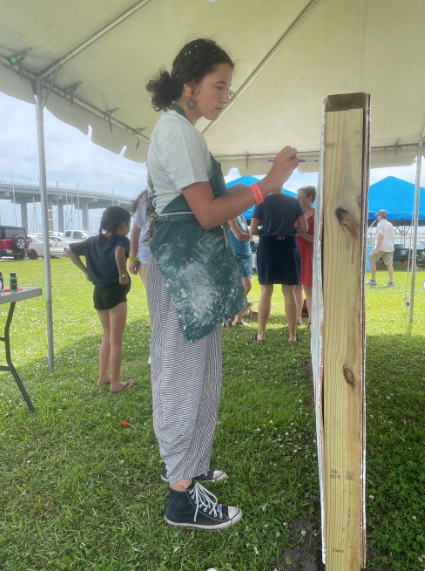
Maggie Murray is a sophomore at East Carteret High School in Carteret County, NC and volunteered to bring the Duke Engage fables to life with her illustrations. The illustrations were completed with water colors and ink pen. When not drawing and painting, Maggie can be found playing her violin, swimming, or listening to true crime podcasts.

You can find the illustrated version of the story ‘Ollie the Orca’ here.
Learn more about…
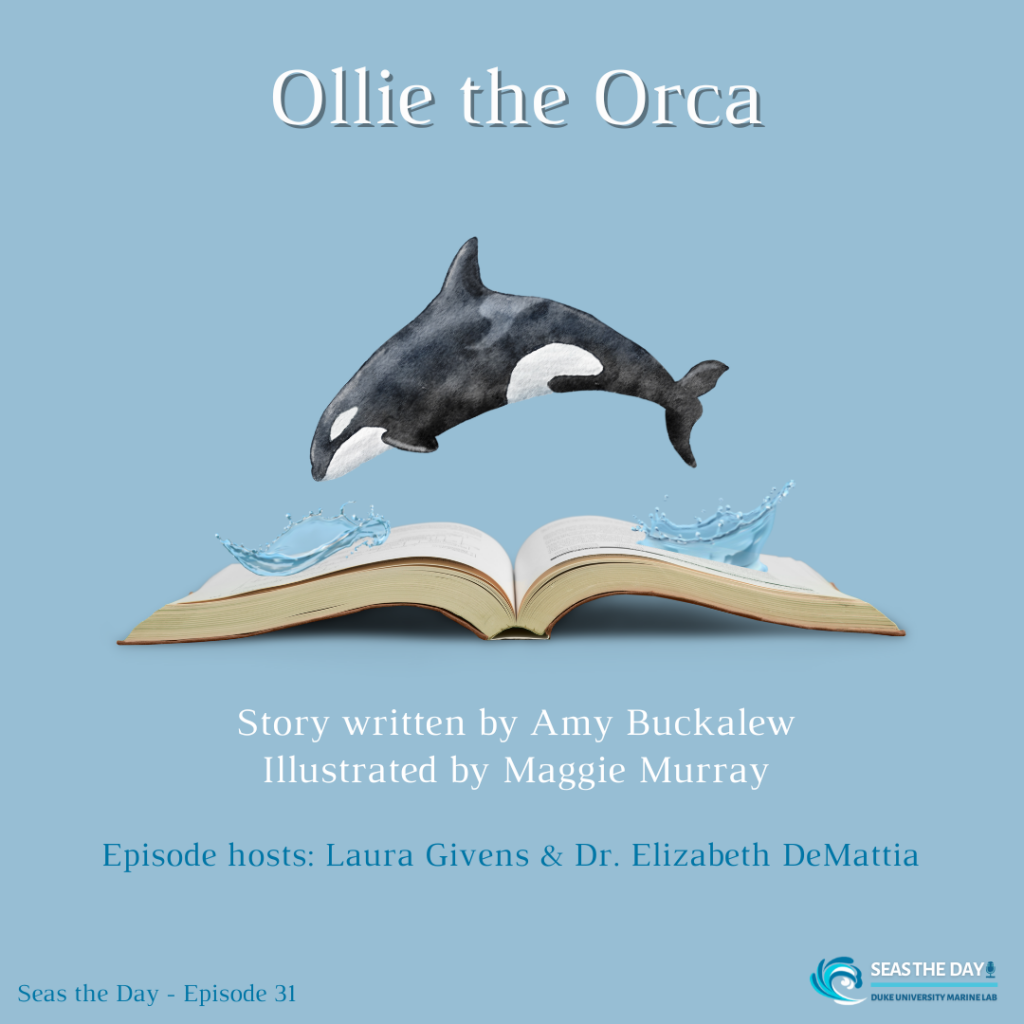
Supplemental material for this episode
TRANSCRIPT: Seas the Day Episode 31
Ollie the Orca
[Music: oyster waltz]
Laura Givens: Hello listeners, welcome to Seas the Day!
This is Laura Givens with the first of three episodes developed by students of the 2022 Duke Marine Lab Duke Engage program. In it, we’ll share more about the Duke Engage program, hear one of the students’ stories, and talk with our first student, Amy Buckalew, about how they began their involvement with CCPS and why they came to Beaufort to do so.
In the following episodes, we’ll be sharing more of the stories written by these students. First, we’ll tell you a little more about Duke Engage. Duke undergraduate students participate in Duke Engage to participate in meaningful collaboration with community partners across the globe. Duke Engage programs are based in both domestic and international settings, with a variety of end goals that revolve around supporting and aiding local groups and organizations. Students entering this program look forward to working with others across majors and gaining new perspectives from both their peers and the local community.
Increased storms, shoreline erosion, collapsing fisheries, and changing economies are affecting coastal NC now, not in some nebulous future. The Beaufort program, where these students were based, aims to support and bolster efforts by local organizations that deal with the realities of climate change on the coasts. This program aimed to provide its students with a variety of projects, to take advantage of their strengths and give them opportunities to grow. As such, students in this program worked in collaboration with the Community Science Initiative at the Duke Marine Lab, an initiative that increases community engagement through research – and one that has been spending years developing relationships with organizations in coastal North Carolina. By participating in community partnerships established by the Community Science Initiative, students were able to contribute to long-term ongoing relationships with the organizations and contribute to on-going environmental, educational and conservation projects. They were able to do this in a variety of ways, such as: designing new programs, recording and analyzing data, creating online/social media content, writing and designing manuals and policy briefs, as well as – in the case of this set of podcasts – developing curriculum.
Over the summer, the Duke Engage students on this project worked with the concept of ‘resilience’, and how to apply it into middle school curriculum. The stories you will hear in these episodes were written by the Duke Engage students in collaboration with Carteret County Public Schools.
Now let’s get started with our first story:
[Music: Yellow Cafe]
Amy Buckalew: Hi, my name is Amy Buckalew, and I’m going to be reading my story called Ollie the Orca.
A long time ago, in the deep blue sea, there lived an orca named Ollie. He always noticed that his family and friends did so much together as a pod: they hunted together, played together, and traveled together. Now, Ollie was a rather feisty orca. He was daring, independent, and curious. Every now and then, he wished he could be an animal other than an orca.
Not that there weren’t a lot of great things about being an orca; he did like the idea of growing up to be one of the most majestic, feared hunters in the ocean. It was just that being an orca meant he had to stick with his pod, and Ollie found this awfully boring. Why stay with the same group of orcas all the time? Why couldn’t he be like an octopus, swimming independently wherever they wanted? He couldn’t wrap his mind around this fact, no matter how hard he tried.
It was just another regular day for Ollie and his pod; they were preparing to head out for their afternoon hunt. They set out, and as he glided gracefully through the cool water around him, Ollie’s face quickly spread into a massive grin as the pod swam out above a deep, mysterious-looking trench. Even though this was part of his daily routine, Ollie never got tired of staring into the seemingly endless pool of blue beneath him. As he flapped his fins, he began drifting away from the rest of the orca pod…
“Ollie!” a voice exclaimed from behind him. “Ollie, where are you going?” Another orca swooped in next to Ollie; it was his best friend, Owen, who was a few years older than Ollie. Owen had always been there for Ollie, teaching him all the best water games and hunting tricks.
“What are you doing swimming away? We gotta stay with the pod!” he exclaimed.
Ollie shook his head. “Owen,” he began, trying to nudge his friend away from the pod, “you don’t get it. I want to go off on my own and explore!”
“But Ollie,” Owen replied, “there’s so many things we couldn’t do without our pod. How else will we hunt?”
“There has to be another way to get food without the whole pod being involved,” Ollie argued. “I know we usually work together to make waves and get seals to slide off of the icebergs, but it shouldn’t always have to be that way.”
“I thought the same thing when I was your age,” Owen began, “but you have to understand that we can’t do everything on our own. To get food, we have to work together as a group!”
But it was too late. With a quick flip of his fin, Ollie darted away from the pod, launching himself into the abyss of water below.
A couple hours after leaving the pod, Ollie spotted an innocent seal resting atop an iceberg, practically waiting to be eaten. Perfect! Olliethought. My first catch! This will be easy peasy.
Ollie began flapping his fins around like he always saw the older orcas do, trying his best to create waves large enough to rock the seal off the ice and into the water. But Ollie’s impact was not nearly enough to shake up the sea and deliver him a taste of victory. He wasn’t used to this- his role was normally to help catch the seal once it fell in.
“Come on!” Ollie shouted in distress. “Why won’t it move?” he cried, the iceberg remaining stable atop the water. Thrashing around helplessly, Ollie began to understand what Owen meant. He couldn’t do this alone; without the teamwork of his pod, he couldn’t get the fuel he needed to survive. How would he ever swim around, explore, or play without other orcas? Panting, Ollie swam away from the iceberg in defeat.
Ollie awoke to the sound of his stomach grumbling. He hadn’t eaten in nearly two days, and he was starting to really understand that Owen was on to something. He should have listened.
Suddenly, the sound of his rumbling stomach was muffled by a sharp noise, one he had heard before. Ollie knew that sound all too well, and it was enough to shake him from his deep slumber. It was the call of his orca pod! Ollie darted deep into the water and swam as fast as his fins could take him, each stroke bringing him closer and closer to the sound.
The call of his pod continued to ring out, and it was music to his ears. As the sound grew louder, Ollie’s heart swelled with gratitude, and soon enough he saw Owen and the rest of his pod swimming towards him. Despite wanting to leave the pod, they hadn’t abandoned him; in fact, they were eager for his return.
“Ollie!” Owen shouted. “There you are!”
“Owen, I’m so sorry for leaving,” Ollie replied. I should have listened to you, you guys are probably so angry at me now…”
Owen shook his head. “Of course we aren’t mad, Ollie! We were just so worried about you. But we’re so glad you came back.”
Ollie smiled, realizing how lucky he was to have a loving, supportive group of orcas he could always count on. There were some things he couldn’t do without his pod, and that was okay. As he made his way back home, chatting with Owen, he understood that there were some things that his pod couldn’t do without him, either.
He could still be proud of his ability to think quickly and be creative on the spot, and put this to use while hunting. He could still spot icebergs from far away, helping guide the pod towards food.
Most importantly, Ollie learned that no matter what, staying with his pod meant that he always had a support system. They were there for him when he needed help, but they also celebrated his strengths as an independent orca.
As Ollie watched the sun rise over the horizon, with Owen by his side, he stretched his fins and sighed happily. He couldn’t wait to spend the day ahead doing all his favorite things with his pod there to support him.
[Music: Yellow Cafe]
Laura: Ollie learned a lot about himself and his relationships. Our author, Amy Buckalew, talks about these lessons and lessons on community engagement in the following interview:
Laura: I’m here today with Amy Buckalew, author of Ollie the Orca.
Amy, why don’t you tell us a little about yourself.
Amy: I’m a rising sophomore at Duke, I’m planning to study statistical science and potentially computer science, and maybe focus on some Earth and Climate Science as well. I’ve always been very interested in conservation and ecological issues, and I know the Duke Marine Lab is a hub for a lot of research and cool outreach focusing on those topics. So, it’s been amazing to have the opportunity to be here this summer at the lab.
Laura: That sounds like a really cool intersection of interests! I’m glad you had such a good time here. Would you be able to walk us through the development process for this story? How did it evolve as you were writing it?
Amy: The first thing we looked at when we were developing these stories was, we sat down and looked at different examples of resilience in nature. So, our program director Liz sat down with us and told us about some different examples she had seen in nature that she thought would be really great examples for our stories. And we were also given the creative freedom to think about our own as well. I’m a big whale person, I really like orcas, so I thought that orca pods would be a perfect way to demonstrate some of the pillars of resilience that we learned about when we were developing these stories.
So, there’s six pillars we’re able to talk about and they kind of manifest themselves in different ways throughout nature – but just sitting down and really getting to understand those pillars of resiliency before we even jumped into writing these stories, I think was super helpful to the foundation of the themes in those stories.
Laura: Tell us a little bit about the pillars that were involved in your story?
Amy: Yeah, so some of the pillars that my story really focuses on are self-awareness, optimism, and connection – those are three big ones. So, connection is something that comes into play a lot in ecology and personal resilience. When we look at orcas they are very dependent on each other, they travel in pods, they do hunting together, they have specific calls that they use to identify each other in the water, and they’re just very dependent as a whole on their pod. So in my story I really focused on that idea of having connections and having people you can reach out to when you need help and knowing that there are certain things that you can’t do on your own and that’s okay and that it’s important to have people that you can lean on when you need help for things.
As far as self-awareness goes, I chose to focus on this in my story with Ollie’s hunting abilities. Orcas hunt as a group, and they each have separate roles when they’re hunting. So, Ollie had to learn, a little bit the hard way, that he could not do all of the hunting roles on his own. He had to be self-aware to understand what his strengths were as an orca and what his weaknesses were. And that taught him how to rely on his peers for some things but also to hone into his own strengths when necessary. And he also had to learn how to be a little bit optimistic. When he was on his own, he was optimistic at first about his own hunting abilities, which he then learned he maybe needed some help but that that was okay. And he was able to come back to his pod, and be optimistic about his future with the pod, and to understand that he had a loving and supportive group of orcas to be there with him.
Laura: That’s awesome, I love how you meshed those two concepts together and I think this going to be great to have students learning both the ecological and the personal styles of resilience at the same time. What was your favorite part of developing this story?
Amy: I think my favorite part of developing this was getting to see how excited teachers were about this idea of incorporating resiliency into the classrooms through a story like this. At first, I was a little unsure about how my story would be received by teachers and how students would receive the stories – I just wasn’t sure if my story would be up to par. This is not something I have a lot of experience with prior to this summer, but it ended up being a really cool experience to get to talk to teachers at the workshops, and to read the stories to them, and just to see how enthusiastic and engaged everyone was about having these stories in their classroom.
Laura: That’s so great, it’s nice to hear how involved the teachers were and how much they appreciated you doing this and how much that stuck with you. These fables were written as part of your summer experience with Duke Engage – can you tell us a little more about what Duke Engage is?
Amy: Yeah, so Duke Engage is a program that focuses on getting Duke students to collaborate with different communities around the world. So, some of those programs are domestic, like the one here at the marine lab in Beaufort, but there’s also several international programs as well. Duke Engage is really big on this idea of students being immersed in the culture and community of different places so that students can grow to understand what societal issues are most prevalent in whatever community they’re going to be working with over the summer.
Laura: So how is writing stories a part of that Duke Engage experience?
Amy: Beaufort is a coastal community and the overarching theme of this particular Duke Engage program at the marine lab is conservation and education. So, when we look at nature and the ecological patterns that govern this coastal community that we’re working with, something we notice a lot is this idea of resilience in nature – how ecosystems are able to bounce back after a disturbance, like a hurricane or a flood. So, the idea is that by writing stories about different examples of resilience in nature we could sort of bring those ideas into the classroom, and help students make connections between ecological resilience and resiliency in their own lives, and that way they can learn about nature and resiliency simultaneously. So this kind of tied into our program’s theme of education and the stories have been a means for us to connect with students and teachers in Carteret County.
Laura: that’s a really great way to get integrated into the community and a really unique perspective on it. What members of the community were you working with over the summer?
Amy: So, this summer we had the opportunity to work with lots of different teachers from several schools in the Carteret County Public Schools system who were looking to implement this idea of resiliency into their classrooms, and just from talking to them and also having experience of, you know, being a middle schooler and being that age in a classroom – what we gathered was that these teachers were really looking for a hands-on, more engaging method to teach their students about resiliency. And when you’re in middle school you really don’t want to be handed a big pamphlet and just asked to read through it – that’s not going to have much of an impact on someone who’s 12 or 13 years old. They’re not going to feel compelled to engage with that material. But if we give them something that shows them the lessons through a story, rather than simply telling them about it, we reach an entirely more effective method of educating these kids.
So just from talking with these teachers, we were able to get a better sense of what they wanted for their classrooms and how important it was for them for their students to learn about resilience in a fun and engaging way. And we also got the chance to work with some high school volunteers from around Carteret County who were part of a positive youth development program. We were able to read our stories to them as well, which was a lot of fun because we could see how an older group of kids would receive these stories and get a grasp for what lessons they were able to take away from these stories. And that kind of indicated to us what was working and what wasn’t, and we were able to tell what lessons students would be able to grasp from our stories, which was super important to us.
Laura: That’s amazing! It’s so cool that you were able to work with so many different people and so many groups of people for this project. So, what advice would you give to someone who is also interested in also engaging with their community – maybe not part of a program like this, but just in their day to day lives.
Amy: I think one of the biggest pieces of advice I would give to somebody would be that before you even start working, or before you jump into anything, I think the most important thing to do is to just talk to a bunch of people and make sure you’re really understanding that community and what they believe are the biggest issues that they’re facing. I think another big issue when we’re talking about community engagement is focusing on that idea of the community engagement continuum, which is a model that describes different levels of mutual respect and trust in community engagement and really enforces this idea of mutual respect and trust to build meaningful relationships and partnerships within that community. So, I think first and foremost you need to really immerse yourself within that community and get some background as to how they operate so that you can better understand what kind of challenges are most prevalent there.
And I think it’s important to remember that its highly probable that you don’t know what a community needs as well as people in that community who are truly familiar with it, so just being open to learning from people in the community is probably the best way to find a common ground and to establish the empathy that you need to do productive work with them. I think that’s a common mistake that people can make, that they look at a community and go: “hey, you know, I think they should work on this” – but a lot of times that’s not correct and it’s not until you let the community speak for itself that you can fully engage with the people in it.
I think another piece of advice that I would give to someone who’s looking to engage with a community is consider what’s going to happen in the long term. Our Duke Engage program is only here in Beaufort for 8 weeks and ideally, we don’t want to come here for such a short period of time, do a little bit of work, and then leave and forget that anything happened, you know. Instead, our goal is to spend that short period of time getting the ball rolling, creating a blueprint for something that can continue to grow after we’ve packed up our things and left – and while that’s something that’s definitely easier said than done, I think it’s something really important to remember for people who are looking to engage with the community.
I know that’s something I’m definitely really proud of with these projects and why this opportunity working with the high schoolers and the teachers with the resiliency programming has been so incredible, because it’s something we can equip teachers with when our program has left this community. The Carteret County Public Schools will hopefully have this lasting product that they can implement into their classrooms for as long as they want, and they can continue to add onto that resiliency curriculum and allow for it to grow and change as needed.
But in reality, community engagement is really just a long running experiment and I think a mistake people often make is that they don’t consider what going to happen when they leave. So, I think something people should try to keep in mind when they’re looking to engage with the community is to think about the long term.
Laura: That’s all really great advice and I appreciate having your perspective on this. Thank you so much Amy for coming and giving your perspective and reading your story – it has been fantastic hearing from you and watching this all develop.
Amy: Yeah, thank you so much for having me! It was great talking to you guys!
[Music: The Oyster Waltz]
Lisa Campbell: You’ve been listening to Seas the Day, a podcast from the Duke University Marine Lab. Today’s episode was written and edited by Laura Givens; the story of ‘Ollie the Orca’ was written and read by Amy Buckalew. To learn more about the author, or to find an illustrated version of the story, visit our website at Nicholas.duke.edu/seastheday. Our theme music was written and recorded by Joe Morton and our Seas the Day artwork is by Stephanie Hillsgrove. Additional artwork for this episode is by Maggie Murray. If you like this episode, please leave us a rating on Apple Podcasts or wherever you listen. And follow us on Instagram and Twitter @seasthedaypod. Now in our third season, we’re keen to expand our audience. Thanks for listening!

